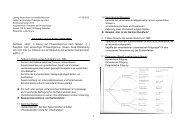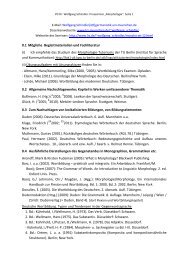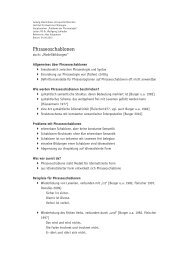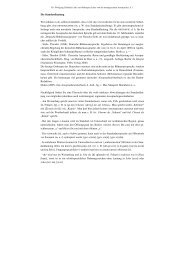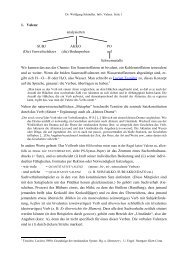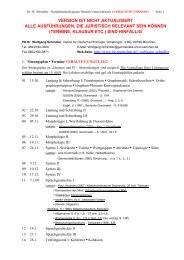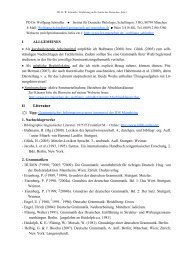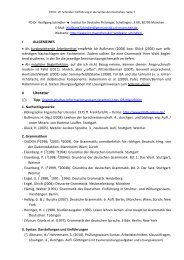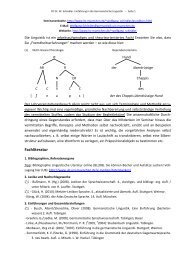Chapter 18 Lexical Functions: Description of Lexical Relations in a ...
Chapter 18 Lexical Functions: Description of Lexical Relations in a ...
Chapter 18 Lexical Functions: Description of Lexical Relations in a ...
You also want an ePaper? Increase the reach of your titles
YUMPU automatically turns print PDFs into web optimized ePapers that Google loves.
—<strong>Chapter</strong> <strong>18</strong>. <strong>Lexical</strong> <strong>Functions</strong>— 102<br />
14 (3.3.4, p. 00) In a particular case, a different solution <strong>of</strong> the problem <strong>of</strong> non-empty support<br />
verbs is possible. A noun <strong>of</strong> COLÈRE type can be def<strong>in</strong>ed as ((a) X’s emotion … or (b) X’s<br />
general state caused by this emotion). With such a disjunctive def<strong>in</strong>ition, we could postulate that<br />
être [en ~] works for the ‘global’ mean<strong>in</strong>g <strong>of</strong> COLÈRE, while éprouver et ressentir are con-<br />
stra<strong>in</strong>ed: “only COLÈRE(a)”.<br />
15 (3.3.4, No. 43, p. 00) A ma<strong>in</strong> Surface-Syntactic Object <strong>of</strong> an LU L is either its Dir(ect) O(b-<br />
ject) (if L can have a DirO), or its Indir(ect)O (if L cannot have a DirO), or the strongest Prep(o-<br />
sitional)O (<strong>in</strong> the absence <strong>of</strong> both DirO and IndirO).<br />
16 (3.3.4, p. 00) Interest<strong>in</strong>gly, the book by Deribas presents 4962 phrases us<strong>in</strong>g 723 different sup-<br />
port verbs. This clearly illustrates the wealth <strong>of</strong> support verbs and correspond<strong>in</strong>g constructions—<br />
at least, <strong>in</strong> Russian.<br />
17 (3.3.4, Nos. 49-51, p. 00) In conformity with Kahane & Mel’čuk 2006, we call a causation<br />
verb a verb that expresses the mean<strong>in</strong>g <strong>of</strong> causation, without <strong>in</strong>dicat<strong>in</strong>g the result <strong>of</strong> the latter;<br />
thus, [to] CAUSE, FORCE [Y to do Z], LEAD [Y to do Z], PROVOKE, PRODUCE, ALLOW, STOP [Y<br />
from do<strong>in</strong>g Z], etc. are causation verbs.<br />
<strong>18</strong> (3.3.4, Nos. 49-51, p. 00) ÊTRE à does not appear as such <strong>in</strong> French as the value <strong>of</strong> Func1 <strong>of</strong><br />
ENVIE: *l’envie d’y aller est à Pierre.<br />
19 (3.3.4, p. 00) An excellent illustration <strong>of</strong> values <strong>of</strong> the LF Real (and AntiReal) <strong>in</strong> English is<br />
<strong>of</strong>fered <strong>in</strong> Montreal’s The Gazette, Sept. 28, 1985, <strong>in</strong> a letter to the columnist Ann Landers,<br />
which I reproduce here:<br />
Dear Ann:<br />
I discovered this item stuck <strong>in</strong> an old book. It was written <strong>in</strong> longhand and there is no sign<br />
<strong>of</strong> an author. I hope you will pr<strong>in</strong>t it. I found it highly <strong>in</strong>spirational. —T.D.<br />
Dear T. D.: So did I. Here it is:<br />
What is Life?<br />
Life is challenge ... meet it.<br />
Life is a gift ... accept it.<br />
Life is an adventure ... dare it.<br />
Life is a sorrow ... overcome it.<br />
Life is a tragedy ... face it.<br />
Life is a duty ... perform it.


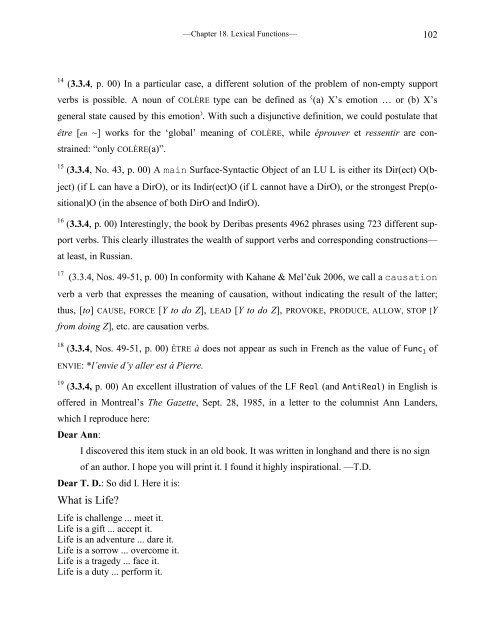
![E-Mail: Wolfgang.Schindler[ätt]germanistik.uni-muenchen.de Web ...](https://img.yumpu.com/51590147/1/184x260/e-mail-wolfgangschindlerattgermanistikuni-muenchende-web-.jpg?quality=85)
